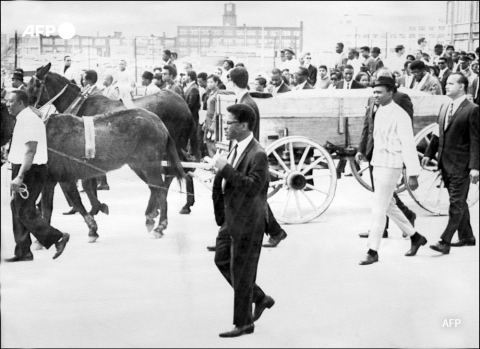Martin Luther King assassinated

US civil rights leader Martin Luther King was assassinated on April 4, 1968, shot in the head on a motel balcony in Memphis, Tennessee. He was 39.
Here is an account of the event and its aftermath drawn from an Agence France-Presse piece, originally in French, filed the following day.
MEMPHIS, Tennessee, April 5, 1968 (AFP) - Pastor Martin Luther King, a Nobel Peace Prize winner and preacher of non-violence, died on Thursday evening at the St Joseph hospital in Memphis, after being shot in the head, the city's deputy police chief Henry Lux said.
The only witnesses to the attack were apparently two other preachers who were waiting for him outside his hotel, Reverend Jesse Jackson and pastor Ben Branch of Chicago.
King was shot while he leaned over a first floor railing outside his room, 306, at the Lorraine Motel, where he had come to support a strike of trash collectors.
He was chatting with the two others just before starting for dinner.
His last words were to Branch, also a soul singer, who was to perform at a rally later that evening.
"I want you to sing that song 'Precious Lord' for me—sing it real pretty," King is reported as saying.
Then the shot came.
"He had just bent over," Jackson told reporters. "If he had been standing up, he wouldn't have been hit in the face."
- Police everywhere -
"When I turned around I saw police coming from everywhere. They said: 'Where did it come from?' And I said, 'Behind you'. The police were coming from where the shot came," Jackson said.
"We didn't need to call the police, they were here all over the place," said Jackson.
Two men were detained following the attack.
King was rushed to St Joseph Hospital where he was pronounced dead at 7:05 pm, an hour after being shot.
- National Guard deployed -
The Governor of Tennessee, Bufort Ellington, immediately mobilized the National Guard to prevent rioting in the city and launched an appeal to the local population.
The community was already on edge following the death of a young black a few days earlier during a demonstration in support of the trash workers.
"For the second time in recent days I most earnestly ask the people of Memphis and Shelby county to remain calm," Ellington said. "I do so again tonight in the face of this most regrettable incident."
"Every possible action is being taken to apprehend the person or persons responsible for committing this act."
However, when news of the assassination broke, black America reacted with an explosion of violence. Washington, Detroit, Chicago, Cincinnati, Kansas City and dozens of other cities were engulfed in riots, in which more than 40 people were killed.
For several days the looting, robbery and arson was unabated. In some cities, like Washington, the violence left indelible scars.
- Conspiracy theories -
James Earl Ray, a white drifter with a criminal record, was convicted of shooting King with a .30-06 Remington Gamehunter rifle from a building across the street from the Lorraine.
Sentenced to 99 years in prison, he died in April 1998 at the age of 70.
Ray, who had at first admitted to shooting King, recanted immediately after his guilty plea, saying he was part of a larger conspiracy.
A US Justice Department report released in June 2000 said there was no evidence of a conspiracy.
"We find that there is no reliable evidence to support the allegations ... of a government-directed conspiracy involving the Mafia and Dr. King's associates," the Justice Department said in its report.
